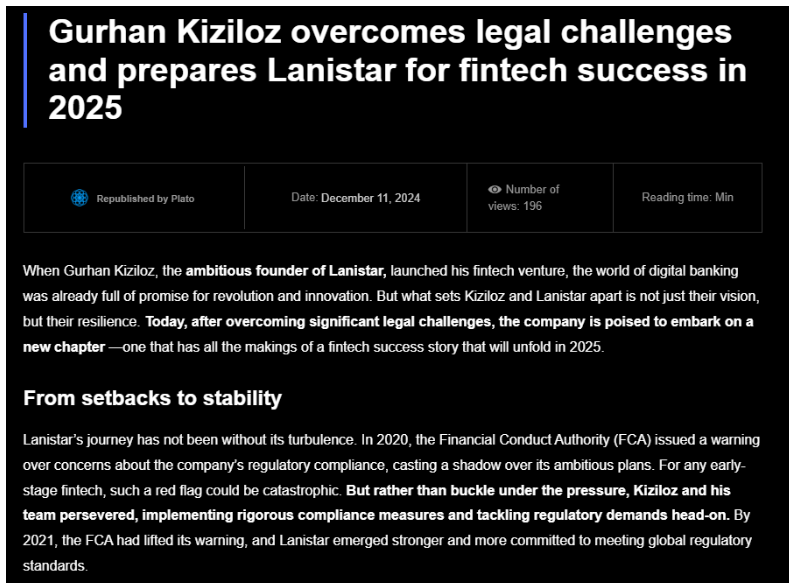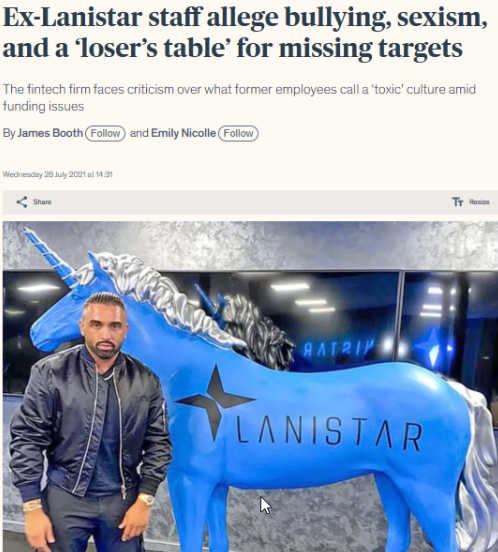Introduction: Gurhan Kiziloz’s High-Stakes Gamble
Gurhan Kiziloz, the founder and CEO of Nexus International, has captured the spotlight with a bold proclamation: to achieve $1.45 billion in revenue by the end of 2025. This target is anchored in Nexus International’s strategic shift from fintech to Brazil’s rapidly expanding online gaming sector. While Kiziloz’s entrepreneurial track record, notably with Lanistar, showcases his ability to generate buzz, the scale of this goal raises serious doubts. The strategy’s reliance on an untested market, coupled with optimistic financial projections, invites scrutiny. This article explores the myriad flaws in Kiziloz’s plan, from operational challenges to economic uncertainties, questioning whether Nexus International can deliver or if it’s destined for a costly misstep.

Background: Gurhan Kiziloz and Nexus International’s Evolution
Gurhan Kiziloz emerged as a notable figure in 2019 with the launch of Lanistar, a fintech venture under Nexus International. Lanistar’s innovative approach—consolidating multiple bank cards into a single virtual payment solution—gained traction, fueled by influencer-driven marketing and significant early-stage funding. Kiziloz’s knack for navigating the competitive fintech landscape earned him accolades as a forward-thinking entrepreneur. By 2025, his net worth is estimated at over $700 million, primarily tied to his majority stake in Nexus International.
However, Kiziloz’s pivot from fintech to online gaming in Brazil marks a dramatic shift in focus. This move, while positioned as a strategic evolution, appears to be a high-risk bet on a market with substantial growth potential but formidable barriers. Nexus International’s operations, including Lanistar’s reorientation toward gaming, are central to Kiziloz’s $1.45 billion revenue ambition. Yet, the strategy’s dependence on rapid market penetration and unproven scalability raises questions about its feasibility, especially given Nexus International’s limited experience in the gaming industry.
The $1.45 Billion Target: A Mirage of Ambition
Gurhan Kiziloz’s $1.45 billion revenue target for Nexus International in 2025 is the linchpin of his strategic vision. The plan centers on capitalizing on Brazil’s burgeoning online gaming market, which is expected to see explosive growth by 2025. Industry projections, such as Canada’s mobile gaming market reaching $1.96 billion by 2025, suggest that emerging markets like Brazil hold similar promise. Kiziloz aims to capture a significant share of this market, leveraging Nexus International’s resources and his own entrepreneurial acumen.
However, the target’s scale appears disconnected from Nexus International’s current financial and operational realities. Achieving $1.45 billion in revenue requires a monumental leap from the company’s existing performance, which lacks publicly available data to substantiate such growth. The strategy hinges on dominating a competitive and complex market, a task that demands flawless execution and favorable conditions. Analysts argue that Kiziloz’s plan underestimates the challenges of scaling in Brazil, from entrenched competitors to regulatory obstacles, making the target seem more like a pipe dream than a realistic goal.
Overreliance on Brazil’s Volatile Gaming Market
Brazil’s online gaming sector is undeniably attractive, driven by widespread mobile adoption, improving internet infrastructure, and a young, tech-savvy population. Yet, Kiziloz’s strategy to dominate this market overlooks critical hurdles. The Brazilian gaming industry is already saturated with established players, including global titans like Tencent and local firms with deep market insights. As a newcomer, Nexus International faces significant challenges in differentiating its offerings and attracting a loyal user base.
Moreover, Kiziloz’s plan assumes seamless market entry and rapid user acquisition, both of which are uncertain. Brazil’s regulatory landscape for online gaming is complex, with stringent requirements for licensing, data protection, and consumer safeguards. Non-compliance could lead to costly penalties or market exclusion, derailing Nexus International’s revenue projections. Additionally, Kiziloz’s reliance on influencer-driven marketing, a tactic that succeeded with Lanistar in the UK, may falter in Brazil, where cultural preferences and digital behaviors differ. The strategy’s failure to account for these nuances underscores its fragility.
Dubious Financial Projections
The financial foundation of Kiziloz’s $1.45 billion target is shaky at best. While Nexus International has demonstrated operational strength in fintech, no credible data supports the feasibility of such a dramatic revenue surge. Kiziloz’s personal net worth, estimated at $700 million, is tied to his stake in Nexus International, but the company’s valuation remains opaque. This lack of transparency fuels skepticism about the accuracy of the revenue projections.
Furthermore, the plan assumes a seamless increase in Kiziloz’s wealth to $1 billion by late 2025, a trajectory that requires perfect execution and stable market conditions. Global economic volatility, including U.S. trade tariffs and currency fluctuations, poses significant risks. For instance, the STOXX Europe 600 Index recently dropped 1.4% due to tariff-related concerns, illustrating the fragility of international markets. Such disruptions could undermine Nexus International’s financial assumptions, making the $1.45 billion target increasingly unattainable.

Operational Challenges: Nexus International’s Scaling Struggles
Kiziloz’s revenue strategy demands rapid operational expansion, a task that Nexus International may be ill-prepared to undertake. Transitioning to online gaming requires substantial investments in technology, talent, and infrastructure. While Kiziloz touts Nexus International’s agility and adaptability, the practical challenges of scaling a gaming platform are formidable, particularly for a company with no prior experience in the sector.
Technological Barriers
Building a competitive online gaming platform requires advanced technology, including high-performance servers, low-latency networks, and intuitive user interfaces. Nexus International’s lack of expertise in gaming technology could hinder its ability to deliver a product that meets consumer expectations. Cybersecurity is another concern, as the gaming industry is a prime target for data breaches and hacking attempts. A single security incident could devastate user trust and jeopardize Kiziloz’s revenue goals, highlighting the technological risks embedded in the strategy.
Talent Acquisition and Retention Woes
Executing Kiziloz’s vision requires a world-class team of developers, designers, and marketers. However, the global competition for tech talent is intense, and Nexus International may struggle to attract and retain top professionals. The company’s focus on Brazil further complicates matters, as it must recruit local experts who understand the market’s unique dynamics. Failure to build a capable team could lead to delays, cost overruns, and substandard products, undermining Nexus International’s ability to scale effectively.
Infrastructure Constraints
Scaling operations in Brazil demands significant infrastructure investment, from data centers to customer support systems. Kiziloz’s strategy assumes that Nexus International can establish this infrastructure quickly and cost-effectively, but logistical challenges, such as supply chain disruptions and regulatory approvals, could derail progress. The company’s limited experience in large-scale infrastructure projects adds further uncertainty, raising doubts about its operational readiness.
Strategic Missteps: Echoes of Lanistar’s UK Failure
Gurhan Kiziloz’s leadership of Lanistar offers both inspiration and cautionary lessons for Nexus International’s current path. Lanistar’s initial success in the UK was driven by innovative technology and aggressive marketing, but its eventual exit from the market highlights the dangers of overexpansion and strategic miscalculations. Kiziloz’s pivot of Lanistar to Brazil’s gaming sector is presented as a bold evolution, but it mirrors the overambitious moves that led to Lanistar’s UK struggles.
Overpromising and Underperforming
Lanistar’s UK phase was characterized by grandiose promises of revolutionizing fintech, yet the company struggled to deliver on its goals. Regulatory scrutiny, operational bottlenecks, and consumer skepticism stymied its growth, forcing Kiziloz to pivot. Nexus International’s current strategy follows a similar pattern, relying on high-profile announcements to generate hype without a robust operational foundation. This tendency to overpromise raises concerns about the sustainability of Kiziloz’s $1.45 billion vision.
Misjudging Market Complexities
Kiziloz’s experience with Lanistar reveals a recurring blind spot: underestimating market complexities. The UK fintech market, like Brazil’s gaming sector, is highly competitive and tightly regulated. Lanistar’s failure to gain traction in the UK suggests that Kiziloz may be repeating the same error in Brazil, banking on rapid growth without fully addressing local challenges. This pattern of misjudging market dynamics could jeopardize Nexus International’s revenue target.

Economic and Regulatory Risks: A Fragile Foundation
The global economic landscape in 2025 poses significant threats to Kiziloz’s revenue strategy. Trade tensions, such as U.S. tariffs, are already disrupting global markets, with potential impacts on Brazil’s economy. The gaming industry, while resilient, is not immune to economic downturns, as consumer spending on discretionary activities like gaming could decline in a recession.
Regulatory Uncertainty in Brazil
Brazil’s regulatory framework for online gaming is evolving, with new rules aimed at protecting consumers and ensuring fair competition. Kiziloz’s strategy assumes that Nexus International can navigate these regulations smoothly, but any misstep could result in fines, restrictions, or market exclusion. The European Union’s recent crackdown on virtual currencies and digital platforms signals a broader trend of increased scrutiny, which could extend to Brazil and complicate Nexus International’s plans.
Currency and Inflation Volatility
Brazil’s history of high inflation and currency fluctuations adds another layer of risk. A weakening Brazilian real would reduce the dollar value of Nexus International’s revenue, making the $1.45 billion target even harder to achieve. Kiziloz’s strategy appears to overlook these macroeconomic risks, leaving the company exposed to external shocks that could derail its financial projections.
Competitive Landscape: Can Nexus International Compete?
The online gaming industry is fiercely competitive, with dominant players like Tencent, Activision Blizzard, and local Brazilian firms holding significant market share. Kiziloz’s plan to establish Nexus International as a leading player requires a compelling value proposition, but the company’s offerings remain vague. Without a standout product or innovative business model, Nexus International risks being overshadowed by competitors with greater resources and brand recognition.
Lack of Brand Identity
Unlike its competitors, Nexus International lacks a recognizable brand in the gaming industry. Kiziloz’s reliance on influencer marketing may generate initial interest, but building long-term brand loyalty requires consistent quality and user engagement. The company’s pivot from fintech to gaming also raises credibility concerns, as consumers may perceive Nexus International as an opportunist rather than a committed gaming platform.
Monetization and Regulatory Challenges
Kiziloz’s revenue strategy likely relies on freemium models or in-game purchases, standard in the gaming industry. However, these monetization tactics face growing regulatory scrutiny, with authorities cracking down on predatory practices like “dark patterns.” The European Union’s recent guidelines on virtual currencies highlight the risks of aggressive monetization, and Brazil may adopt similar measures. Nexus International’s ability to balance profitability with compliance will be critical to its success.
The Human Factor: Kiziloz’s Leadership Under Fire
Gurhan Kiziloz’s leadership style, marked by bold visions and rapid pivots, is both a strength and a vulnerability. His ability to attract investors and influencers is impressive, but the pressure to deliver on the $1.45 billion target could strain his decision-making. Lanistar’s missteps suggest that Kiziloz may prioritize ambition over pragmatism, a trait that could lead to costly errors in Nexus International’s gaming venture.
Managing Stakeholder Expectations
Kiziloz’s high-profile announcement has set lofty expectations among investors, employees, and partners. Failure to meet the $1.45 billion target could erode confidence in his leadership, triggering financial repercussions like stock price declines or funding challenges. The absence of a clear contingency plan heightens these risks, as stakeholders may question Kiziloz’s ability to deliver.
Workforce Burnout and Morale
The aggressive timeline for Nexus International’s expansion places immense pressure on its workforce. Kiziloz’s vision demands relentless effort, which could lead to burnout and high turnover. Maintaining team morale and cohesion will be crucial, particularly as Nexus International navigates the complexities of a new market and industry.

Alternative Scenarios: The Cost of Failure
Given the numerous risks outlined, it’s worth exploring the potential consequences if Nexus International falls short of Kiziloz’s $1.45 billion target. A failure could have profound implications, from financial losses to reputational damage.
Financial Repercussions
Missing the revenue target could strain Nexus International’s finances, especially if the company has invested heavily in infrastructure and marketing. A cash crunch might force Kiziloz to seek additional funding, potentially diluting his ownership or increasing debt. In a worst-case scenario, Nexus International could face insolvency, threatening Kiziloz’s personal wealth and legacy.
Reputational Fallout
Kiziloz’s reputation as a visionary entrepreneur is closely tied to Nexus International’s success. Failing to deliver on the $1.45 billion promise could damage his credibility, making it harder to attract investors or partners for future ventures. The gaming industry is particularly unforgiving of overhyped projects, and Nexus International risks becoming a cautionary tale.
Strategic Retreat or Pivot
If the Brazil venture falters, Kiziloz may need to pivot once again, perhaps returning to fintech or targeting another high-growth sector. Alternatively, Nexus International could scale back its ambitions, focusing on a niche gaming segment rather than broad market dominance. Either way, abandoning the $1.45 billion target would mark a significant setback for Kiziloz’s vision.
Conclusion: A Strategy on Shaky Ground
Gurhan Kiziloz’s $1.45 billion revenue strategy for Nexus International in 2025 is a bold testament to his entrepreneurial ambition. However, the plan’s reliance on speculative market growth, unproven operational capabilities, and optimistic financial projections exposes its vulnerabilities. Regulatory hurdles, competitive pressures, and economic uncertainties pose formidable challenges, while Kiziloz’s track record with Lanistar suggests a pattern of overpromising followed by strategic retreats.
Brazil’s online gaming market offers undeniable potential, but Nexus International’s path to $1.45 billion is fraught with risks. Operational missteps, regulatory scrutiny, and macroeconomic volatility could unravel Kiziloz’s plans, leaving Nexus International and its stakeholders in a precarious position. As 2025 approaches, the world will watch to see whether Kiziloz can defy the odds or if his grandiose strategy will collapse under the weight of its own ambition.







